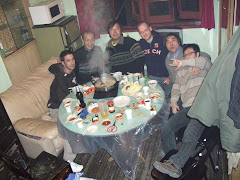Thursday was the Dragon Boat Festival, a major holiday in China. I posted a short description of the reasons and history behind the festival below. The two major aspects I want to comment on are:
1) Everybody was off from school and work on Thursday and Friday. However, in exchange, everyone had to work today (Sunday). Would you make this trade-off? I've thought it over and I like the concept. If the government or my boss wants to give me two weekdays off in exchange for a weekend day, then let's do it. Today was a bit odd though. I woke up and it felt like Sunday, but as the morning progressed and I noticed the usual bustling of the weekend was missing, it felt more like a weekday. By the time I ate lunch, I pretty much forgot today was a Sunday. It flat-out didn't feel like it and I think that's the first time I've had that experience. It was a bit surreal, but then again, what isn't these days?
2) The traditional food to eat during the festival is zongzi, which is essentially a rice glue ball. Like the two-for-one deal above, I am a fan of zongzi. Because the rice and stuffing is wrapped in bamboo leaves, they are a bit of a pain to eat and (from what I hear) even more troublesome to make. However, they have a hearty taste, chewy texture and they mark a unique way to celebrate the day.
Here is a bit more about the holiday, which has resulted in me having a five-day weekend. Had I realized I was going to be off for five consecutive days, I would have gone to Shanghai this weekend instead of last. In any case though, I've been making the most of it by studying and watching a couple movies.
---
The Dragon Boat Festival, also called the Duanwu Festival, is celebrated on the fifth day of the fifth month according to the Chinese calendar. For thousands of years, the festival has been marked by eating zong zi (glutinous rice(糯米)wrapped to form a pyramid using bamboo or reed leaves) and racing dragon boats.
The festival is best known for its dragon-boat races, especially in the southern provinces where there are many rivers and lakes. This regatta(赛舟会)commemorates the death of Qu Yuan , an honest minister who is said to have committed suicide by drowning himself in a river.
Qu was a minister of the State of Chu situated in present-day Hunan and Hubei provinces, during the Warring States Period (475-221BC)(战国时期). He was upright, loyal and highly esteemed for his wise counsel that brought peace and prosperity to the state. However, when a dishonest and corrupt prince vilified Qu, he was disgraced and dismissed from office. Realizing that the country was now in the hands of evil and corrupt officials, Qu grabbed a large stone and leapt into the Miluo River on the fifth day of the fifth month. Nearby fishermen rushed over to try and save him but were unable to even recover his body. Thereafter, the state declined and was eventually conquered by the State of Qin.
The people of Chu who mourned the death of Qu threw rice into the river to feed his ghost every year on the fifth day of the fifth month. But one year, the spirit of Qu appeared and told the mourners that a huge reptile(爬行动物)in the river had stolen the rice. The spirit then advised them to wrap the rice in silk and bind it with five different-colored threads before tossing it into the river.
During the Duanwu Festival, a glutinous rice pudding called zong zi is eaten to symbolize the rice offerings to Qu. Ingredients such as beans, lotus seeds(莲子), chestnuts(栗子), pork fat and the golden yolk of a salted duck egg are often added to the glutinous rice. The pudding is then wrapped with bamboo leaves and boiled in salt water for hours.


